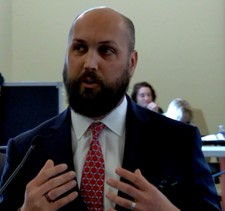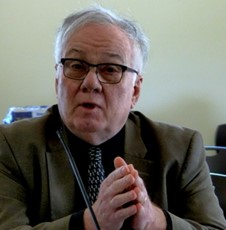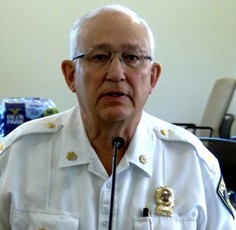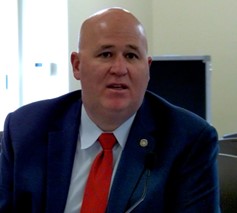May , 2023 Policy Hearing Takeaways
May 8, 2023:
Keeping Our Communities Safe
The House Republican Policy Committee held a public hearing, hosted by Rep. Williams in Glen Mills, to discuss the value provided by our law enforcement officers as well as restorative justice efforts to combat crime and recidivism. Crime negatively impacts our communities, is spreading into previously low crime suburbs, and is a blight on our society. Our law enforcement officers are the first line of defense against increasing crime, and efforts to utilize trauma-informed restorative justice programs can assist in combatting antisocial behaviors and criminal tendencies before the need for our legal system to take action. No Pennsylvanian should feel unsafe in their homes or communities, and the House Republican Policy Committee strived to uncover how best to protect the people of Pennsylvania, empower our first responders, and inspire hope in our safe and successful future.
The testifiers that joined the Policy Committee were as follows:
| Restoring Justice Panel |
Liam N. Power - Chair of the Education Task Force, Office of Advocacy and Reform
Professor Gregg Volz - Director of Youth Courts, Harcum College
| Protecting our Communities Panel |
Chief John Egan - Chief of Police, Bethel Township Police Department
Bob McCarron - President, Chester County Fraternal Order of Police, Lodge 11
Chris Eiserman - President, Delaware County Fraternal Order of Police, Lodge 27
| Agenda - Bios - Testimony |
| Restoring Justice Panel |
Efforts to combat the “school-to-prison” pipeline and reduce criminal recidivism in youth is paramount to securing a safe future. Liam N. Power, Chair of the PA Education Task Force, joined the Committee to share how trauma-informed restorative justice efforts can assist in combatting crimes before they have the opportunity to take place. By working with young offenders with understanding and age-appropriate methods anti-social behaviors can be addressed before the legal system becomes involved in a child’s life.
Liam explained that childhood trauma is directly correlated with adult criminal tendencies. Trauma can come in many forms and may manifest in mental health issues later in life. These mental health issues can then drive a person to commit criminal acts, and statistically 8 in 10 people suffering from mental health ailments will have a negative interaction with our legal system at some point in their lives. By recognizing the trauma that is incurring future crimes, and acknowledging that this trauma can be addressed in adolescence, we can work to empower the troubled youth of Pennsylvania to pursue more positive life choices and benefit our communities.
Efforts to incorporate trauma-informed restorative justice require encouragement of mental health services, particularly for Pennsylvania’s youth. Ideally, individuals struggling with mental health ailments can receive the assistance they need before they are driven towards anti-social acts. If an adolescent commits an offence, then perhaps incarceration is not the best means to reduce future recidivism. Other methods to address negative behaviors exist outside of our legal system. “Youth courts” and discretionary diversionary practices can address the problems incurred by generational poverty and trauma long before our legal means of addressing criminality become necessary.
 |
| WATCH |
| “Trauma informed restorative justice practices build healthy relationships and instills a community-oriented nature.” Liam N. Power Chair of the Education Task Force, Office of Advocacy and Reform |
Building upon the testimony of Liam N. Power, the Committee was joined by Professor Gregg Volz of Harcum College. Professor Volz is the Director of Youth Courts, and has long been a proponent of “youth courts” and age-appropriate peer adjudication of adolescents. He shared the nature of “youth courts”, their necessity to combat the entrance of children into our criminal justice system, and the implications of utilizing “youth courts” to a greater degree throughout the Commonwealth. The school-to-prison pipeline is all too real, and ¼ of all adolescents within the criminal justice system were initially referred by their schools. Alternatives should be investigated, and “youth courts” are one of the means by which we can address this problem in our society.
“Youth courts” are simply a jury of age-appropriate peers coalescing to determine the proper penalties for a youth offender. The offender is found guilty of some offence prior to meeting with their peers, and the “youth court” determines what should be done to address the offence and ensure that future offences are prevented. The positive influence of peer pressure on a child can be more powerful than the consequences of our legal system. Before participating in a “youth court” children are trained by professionals in means to address offences and be understanding of the underlying causes of the offender’s behaviors. These courts can be formed as early as 5th grade and have been shown to reduce the need for suspensions and expulsions all while limiting future referrals to the criminal justice system. “Youth courts” can be formed by any school in Pennsylvania, and Professor Volz expressed his desire to assist in these efforts in whatever capacity our school’s and student’s need.
 |
| WATCH |
| “Things don’t need to be the way they are. These efforts will go a long way in developing the citizens the Commonwealth needs.” Professor Gregg Volz Director of Youth Courts, Harcum College |
| Protecting our Communities Panel |
To begin the conversation on the importance of our police in protecting our communities the Policy Committee was first joined by the Bethel Township Chief of Police, Chief John Egan. Chief Egan is responsible for overseeing a department of 23 part-time officers within a suburban community facing increases in transient crime. The community of Bethel Township is not a haven for criminality in itself, but ease of access through major thoroughfares enables those with criminal intent to travel from Philadelphia or Wilmington, Delaware into the township to prey on the local community. Incidents of out-of-township criminal elements spreading out from major cities are on the rise, and Chief Egan warned of the consequences of not adequately addressing this growing concern.
Chief Egan expressed that he is concerned that the local community is not aware of the challenges being faced by his officers, or of the growing threat of crime seeping into their community. Recruitment and retention of officers is difficult for even the largest departments, and Bethel Township is struggling to have 24/7 coverage of their jurisdiction with their limited resources. Private citizens installing doorbell cameras, cameras in their vehicles, and taking proactive measures assists in addressing a crime after it has occurred, but do not outright prevent crime in the same manner that officers in the community are capable of.
Officers today, with the climate of anti-police rhetoric and excuses for criminal behavior, are hesitant to do their jobs to the fullest. Their hands are tied by the ever-present risk of public outrage and personal liability. To combat stigma and empower his officers, Chief Egan has been attempting to secure body cameras for his department. These body cameras, and the necessary digital storage equipment, are expensive and represent a large investment for a small department that could arguably use these funds for salaries, vehicles, or other necessities. State grants exist for these purchases by departments, but Bethel Township was not selected for a body camera grant due to the community quote, “not experiencing enough crime to warrant the grant.” For Chief Egan the body cameras are not just to address crime, but to protect his officers from liability and shed light on the interaction they have day-to-day within the community.
 |
| WATCH |
| “Officers deserve to have a camera on their body in this day in age. The pictures don’t lie. Body cameras protect our officers and the citizens of the Commonwealth, and state grants should be prioritized.” Chief John Egan Chief of Police, Bethel Township Police Department |
Following Chief Egan’s testimony, the Committee was joined by Bob McCarron, President of the Chester County Fraternal Order of Police Lodge 11, as well as Chris Eiserman, President of the Delaware County Fraternal Order of Police Lodge 27.
 |
| WATCH |
| “People need to be held accountable, or else why do we have laws? Without accountability, we have anarchy. We need to respect and use our existing system.” Bob McCarron President, Chester County Fraternal Order of Police, Lodge 11 |
Officers McCarron and Eiserman expressed that recruitment, retention, and morale of officers across the state is alarmingly low. Our officers are being poached by other states with promises of signing bonuses, increased pay, and honoring of their pensions through pension reciprocity. Exacerbating the issue is the ever-decreasing enrollment numbers of young men and women pursuing a career in law enforcement. Perception is everything, and the Policy Committee was urged to continue recognizing policing as a righteous and noble profession paramount to the continued safety and prosperity of our communities.
Crime is certainly a problem plaguing our societies, but our officers are not adequately supported in their efforts to address criminal elements by our state district attorneys. Our officers investigate a crime, make the arrest, and then rely on our legal system to pursue a prosecution. The city of Philadelphia has shown an unwillingness to prosecute crimes that have been investigated and uncovered by our officers. This unwillingness to recognize and enforce state law has taken a toll on officer morale, empowered criminals, and enabled crime to spread outside of the city of Philadelphia. An example of unprosecuted crime now spreading outside of the city can be seen in roving gangs of ATV and dirt bike riders that have become increasingly hostile on our roads. These gangs of riders swarm in large numbers, disregard traffic laws, and pose a significant threat to upstanding citizens going about their lives.
Outside of the policy and legislative suggestions first shared at the Policy Committee’s “Our First Responders in Crisis” hearing on February 15th the Fraternal Order of Police shared the following suggestions to increase officer recruitment and retention:
| • | Respect collective bargaining rights of officers. | |
| • | Protect officer retirement packages and strengthen them through cost-of-living adjustments. | |
| • | Maintain and modernize police training facilities. These facilities are necessary for an officer to practice their capabilities and skills, and to prepare the next generation of law enforcement for the challenges they will face while performing their duties. | |
| • | Prioritize state grants for officer safety equipment, updated vehicles, and body cameras. | |
| • | Ensure that existing laws are respected and enforced by our legal system. |
 |
| WATCH |
| “Our department is struggling to fill shifts, and this issue needs to be at the forefront of the Commonwealth.” Chris Eiserman President, Delaware County Fraternal Order of Police, Lodge 27 |
As stated by the testifiers that joined the day’s hearing, law enforcement is a righteous and noble profession that is truly a calling for the brave men and women that swear an oath to uphold our laws. Without enforcement, our laws are little more than words on paper. Efforts to address crimes and criminal tendencies before they occur via “youth courts” and trauma-informed restorative justice proposals are worthwhile to investigate, but we will always require professional law enforcement personnel to maintain law and order. We need our officers, and they need us to support their work and champion their efforts. Rep. Craig Williams and Policy Chairman Kail closed the hearing by thanking the day’s testifiers as well as expressing the Republican Caucus’ commitment to supporting the law and those that uphold it.